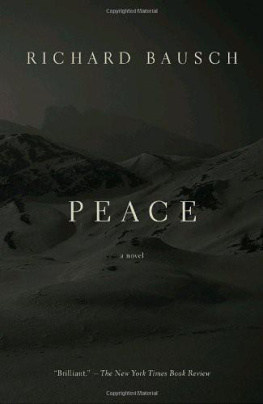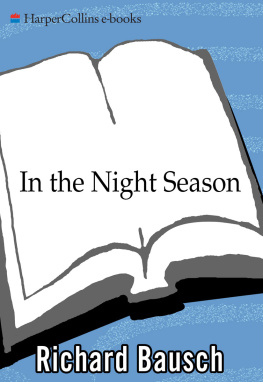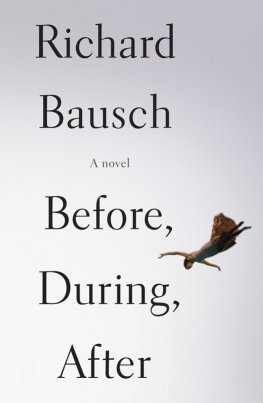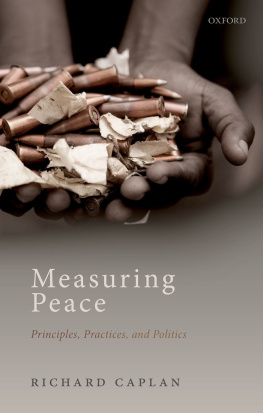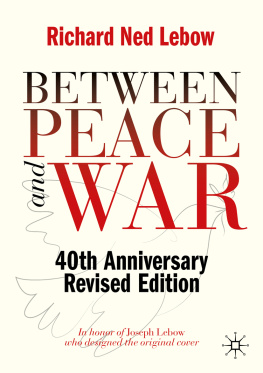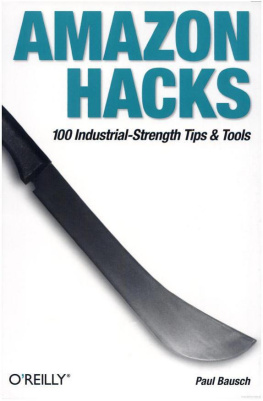Richard Bausch - Peace
Here you can read online Richard Bausch - Peace full text of the book (entire story) in english for free. Download pdf and epub, get meaning, cover and reviews about this ebook. year: 2009, publisher: Vintage, genre: Detective and thriller. Description of the work, (preface) as well as reviews are available. Best literature library LitArk.com created for fans of good reading and offers a wide selection of genres:
Romance novel
Science fiction
Adventure
Detective
Science
History
Home and family
Prose
Art
Politics
Computer
Non-fiction
Religion
Business
Children
Humor
Choose a favorite category and find really read worthwhile books. Enjoy immersion in the world of imagination, feel the emotions of the characters or learn something new for yourself, make an fascinating discovery.
- Book:Peace
- Author:
- Publisher:Vintage
- Genre:
- Year:2009
- Rating:3 / 5
- Favourites:Add to favourites
- Your mark:
- 60
- 1
- 2
- 3
- 4
- 5
Peace: summary, description and annotation
We offer to read an annotation, description, summary or preface (depends on what the author of the book "Peace" wrote himself). If you haven't found the necessary information about the book — write in the comments, we will try to find it.
Peace — read online for free the complete book (whole text) full work
Below is the text of the book, divided by pages. System saving the place of the last page read, allows you to conveniently read the book "Peace" online for free, without having to search again every time where you left off. Put a bookmark, and you can go to the page where you finished reading at any time.
Font size:
Interval:
Bookmark:

CONTENTS
With love, for
ANN MARIE BAUSCH and WESLEY BAUSCH,
who read these pages first
And in loving memory of my father,
ROBERT CARL BAUSCH,
who served bravely in Africa, Sicily, and Italy
Lo, the moon ascending,
Up from the east the silvery round moon,
Beautiful
And my heart, O my soldiers, my veterans,
My heart gives you love.
WALT WHITMAN
Dirge for Two Veterans, Drum Taps
With deepest gratitude, love, and admiration to George Garrett, who for almost twenty years kept after me to write this story
ONE
T HEY WENT ON ANYWAY , putting one foot in front of the other, holding their carbines barrel down to keep the water out, trying, in their misery and confusionand their exhaustionto remain watchful. This was the fourth straight day of raina windless, freezing downpour without any slight variation of itself. Rivulets of ice formed in the muck of the road and made the walking treacherous. The muscles of their legs burned and shuddered, and none of them could get enough air. Robert Marson thought about how they were all witnesses. And nobody could look anybody in the eye. They kept on, and were punished as they went. Ice glazed their helmets, stuck to the collars of their field jackets, and the rain got in everywhere, soaking them to the bone. They were somewhere near Cassino, but it was hard to believe it was even Italy anymore. They had stumbled blind into some province of drenching cold, a berg of death. Everything was in question now.
The Italians had quit, and the Germans were retreating, engaging in delaying actions, giving way slowly, skirmishing, seeking to make every inch of ground costly in time and in blood, and there were reconnaissance patrols all along the front, pushing north, heading into the uncertainty of where the Germans might be running, or waiting.
Marson, sick to his soul, barely matched the pace of the two men just in front of him, who were new. Their names were Lockhart and McCaig, and they themselves lagged behind four others: Troutman, Asch, Joyner, and Sergeant Glick. Seven men. Six witnesses.
The orders had been to keep going until you found the enemy. Then you were supposed to make your way back, preferably without having been seen. But the enemy had the same kinds of patrols, and so recon also meant going forward until you were fired upon. Worse, this was a foot patrol. If you ran into anything serious, there wouldnt be any jeeps to ride out, nor tanks to help you. You were alone in the waste of the war.
And there were only the seven of them now.
Twelve men had left one tank battalion the first day, crossed country, and then slept under the tanks of another on the second, all in the changeless fall of the rain. McConnell, Padruc, and Bailey came down with the dysentery and had to be taken back to Naples. So the patrol left that camp with nine men.
Walberg and Hopewell were killed yesterday.
Yesterday, a farmers cart full of wet straw had come straggling along the road being pulled by a donkey and driven by two Italian boysgypsies, reallywho looked like sopping girls, their long, black, soaked hair framing their faces, their wet cloaks hiding their bodies. Sergeant Glick waved them away, and they melted into the glazed second growth beside the road. Then he ordered that the cart be overturned in order to look for weapons or contraband. Troutman and Asch accomplished this, and as the waterlogged, mud-darkened straw collapsed from the bed of the cart, a Kraut officer and a whore tumbled out, cursing. The Kraut shot Walberg and Hopewell with his black Luger before Corporal Marson put him down. The whore, soggy and dirty and ill looking, wearing another officers tunic over a brown skirt, spoke only German, and she shouted more curses at them, gesticulating and trying to hit at McCaig and Joyner, who held her. Sergeant Glick looked at Hopewell and Walberg, ascertained that they were dead, then walked over, put the end of his carbine at her forehead, and fired. The shot stopped the sound of her. She fell back into the tall wet stalks of grass by the side of the road, so that only her lower legs and her feet showed. She went over backward; the legs came up and then dropped with a thud into the sudden silence. Marson, who had been looking at the Kraut he shot, heard the fourth shot and turned to see this. And he saw the curve of her calves, the feet in a mans boots where they jutted from the grass. For a few seconds, no one said anything. They all stood silent and did not look at one another, or at Glick, and the only sound was the rain.
She was with him. Shedve shot us all if she could, Glick said. No one answered him. Marson had shot the Kraut, and he was having trouble with that, and here were the womans legs stuck out of the grass next to the road. The curve of the calves was that of a young woman. This is all one thing, Glick said, loud. It was as if he were talking to the earth and sky. The others knew he meant that the woman had been a reaction, two men killed like thatshot, both of them, through the heartcompletely unready for it, though Glick had repeatedly told them and they all knew that they should be ready, every second, for just this. This. Walberg and Hopewell, two boys. Hopewell had just been talking about being at a restaurant in Miami Beach, eating Dungeness crabs, how much he wished he were there right now. And Walberg, quiet Walberg, only this morning had been going on about his father, who was a hero to him, and the others had been embarrassed hearing him describe the old man, because of the childlike devotion in it, the hero worship. Grow up, Walberg, Asch had said once. And Walberg had grown up to this, lying by the side of a road somewhere near Cassino, with an expression on his face of mild surprise. Hopewells eyes were closed. He looked like he was asleep.
And they had all been warned to be ready, every second.
But it had been so cold, and the rain kept coming down on them. They had got numb, maybe even drowsythe drowse before you lie down and freeze to death. And they couldnt really look at one another now, and still nobody looked at Glick.
Because this was a recon squadand because the Germans had taken over everything, the war and the retreat and the defense of Italy, and could be closethey had to leave Walberg and Hopewell beside the road and move on, away from the scene, while light left the low, charred-looking folds of the sky. Troutman had radioed back.
There had followed an abysmal long night without any respite from the cold and the rain. Through it all, nobody spoke of what had taken place back down the road. But Marson kept feeling the sickness. It was as if something in him had been leveled, and the simplest memories of himself as he had always been were beside the point. He was devout, because his people were devout, and because it was a strength, and he kept trying to pray, kept saying the words in his mind. All for thee, most sacred heart of Jesus. An offering, as he had been taught. Expiation for his sins, for everything he had ever done that was wrong. It meant little, now. At times he would speak directly to God in his mind, like a man talking to another manexcept that it was somehow more than one other man or, really, one god, but something nameless and immense beyond the raining sky: Let me get through this, help me find forgiveness, and Ill raise a big family. He had a daughter back home, a thirteen-month-old girl whom he had yet to see in person. He kept her photograph tucked away under his shirt, in a flat cigarette tin.
He could not let himself think very much at all. The others were quiet, sullen, isolated. And yet after the misery of the fitful night, they seemed to have put it in its place. It was the war; it was what they had been through. They had lived with confusion for so long. Nobody said anything about it.
Next pageFont size:
Interval:
Bookmark:
Similar books «Peace»
Look at similar books to Peace. We have selected literature similar in name and meaning in the hope of providing readers with more options to find new, interesting, not yet read works.
Discussion, reviews of the book Peace and just readers' own opinions. Leave your comments, write what you think about the work, its meaning or the main characters. Specify what exactly you liked and what you didn't like, and why you think so.

